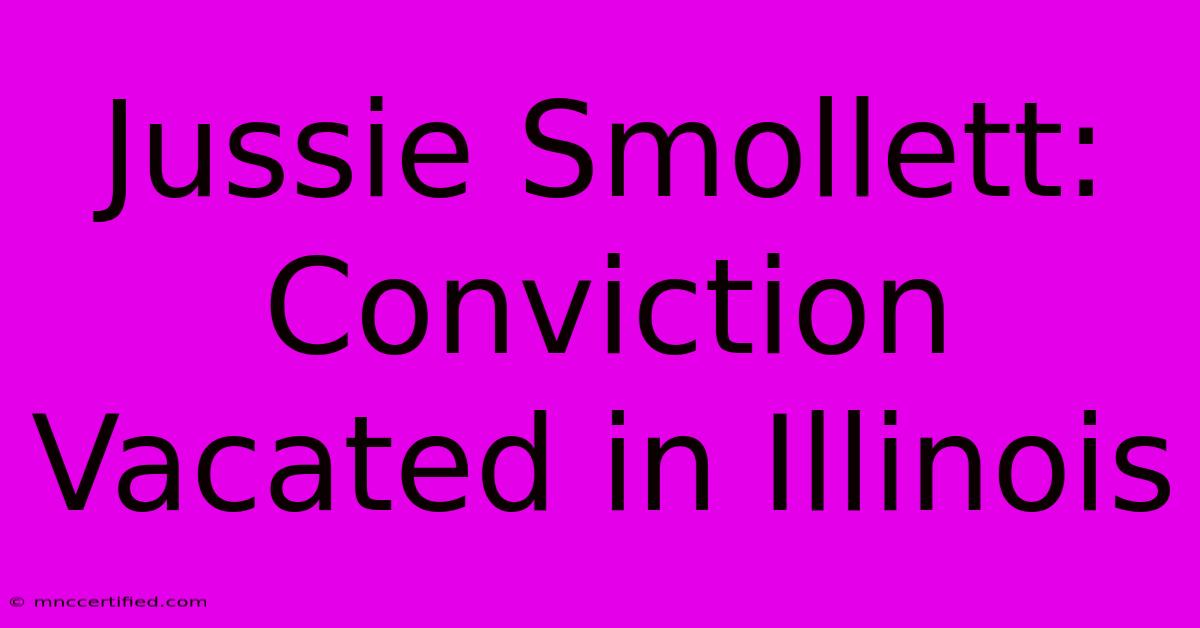Jussie Smollett: Conviction Vacated In Illinois

Table of Contents
Jussie Smollett: Conviction Vacated in Illinois – A Deep Dive into the Case
The Jussie Smollett case, a saga that captivated and divided the nation, took another dramatic turn when an Illinois judge vacated his conviction in March 2022. This decision, while seemingly definitive, leaves lingering questions and highlights the complexities of the American justice system. This article delves into the events leading up to the conviction, the reasons behind its vacating, and the broader implications of the case.
The Alleged Attack and Initial Fallout
In January 2019, Jussie Smollett, then a star on the popular television show Empire, reported a hate crime attack in Chicago. He claimed he was assaulted by two masked men who shouted racial and homophobic slurs, poured bleach on him, and placed a noose around his neck. The incident sparked immediate outrage and widespread condemnation. Major news outlets covered the story extensively, fueling public anger and calls for justice. Law enforcement launched a full-scale investigation.
The Shifting Narrative and Arrest
However, as the investigation progressed, inconsistencies emerged in Smollett's account. Police scrutiny intensified, leading to a dramatic shift in the narrative. Smollett was ultimately arrested and charged with felony disorderly conduct for allegedly staging the attack himself. The charges stemmed from accusations that he orchestrated the incident to garner sympathy and advance his career.
The Trial, Conviction, and Subsequent Appeal
Smollett's trial garnered significant media attention. The prosecution presented evidence suggesting Smollett paid two brothers, Abimbola and Olabinjo Osundairo, to stage the attack. The defense, however, argued that Smollett was the victim of a genuine hate crime. After a high-profile trial, Smollett was found guilty on five of the six counts against him. He was sentenced to a brief jail term, although he ultimately served only a few days before being released pending appeal.
The Vacating of the Conviction: Why and What it Means
The surprising reversal of Smollett's conviction came as a result of a legal challenge. The judge, citing prosecutorial misconduct related to the handling of evidence and potential conflicts of interest, determined that Smollett's Sixth Amendment rights had been violated. This decision means that Smollett's conviction was overturned, and all charges against him were dropped.
Implications and Future Legal Proceedings
The vacating of the conviction doesn't necessarily mean Smollett is exonerated. It implies that the prosecution's conduct compromised the fairness of the trial process. While Smollett is no longer legally convicted, the underlying allegations of staging the attack remain a matter of public debate. It's unlikely that the case is fully closed; depending on future legal developments, the prosecution might attempt to pursue a retrial, although it remains a complex undertaking.
The Broader Impact and Public Perception
The Jussie Smollett case has had a profound impact on public discourse regarding race, hate crimes, and the media's role in shaping public opinion. The case raises critical questions about the responsibility of reporting in the age of social media and the importance of verifying information before widespread dissemination. The conflicting narratives and ultimate vacating of the conviction illustrate the complexities of the justice system and the potential for errors, even in high-profile cases.
Key Takeaways and Ongoing Discussion
The Jussie Smollett case remains a complex and controversial subject, sparking ongoing discussions about justice, media ethics, and the impact of high-profile trials on public perception. The vacating of the conviction, while a significant legal development, doesn’t fully resolve the fundamental questions raised by this deeply divisive case. Further analysis and debate are undoubtedly warranted.
Keywords: Jussie Smollett, conviction vacated, Illinois, hate crime, trial, appeal, prosecutorial misconduct, Sixth Amendment, media coverage, public perception, legal implications, Chicago.

Thank you for visiting our website wich cover about Jussie Smollett: Conviction Vacated In Illinois. We hope the information provided has been useful to you. Feel free to contact us if you have any questions or need further assistance. See you next time and dont miss to bookmark.
Featured Posts
-
Cameron Mutual Insurance Closing
Nov 22, 2024
-
Putin Russia Launches Missile At Ukraine
Nov 22, 2024
-
247 Sports Julian Lewis Joins Colorado
Nov 22, 2024
-
Post Steelers Fields Three Best Options
Nov 22, 2024
-
How To Invest 25k In Real Estate
Nov 22, 2024